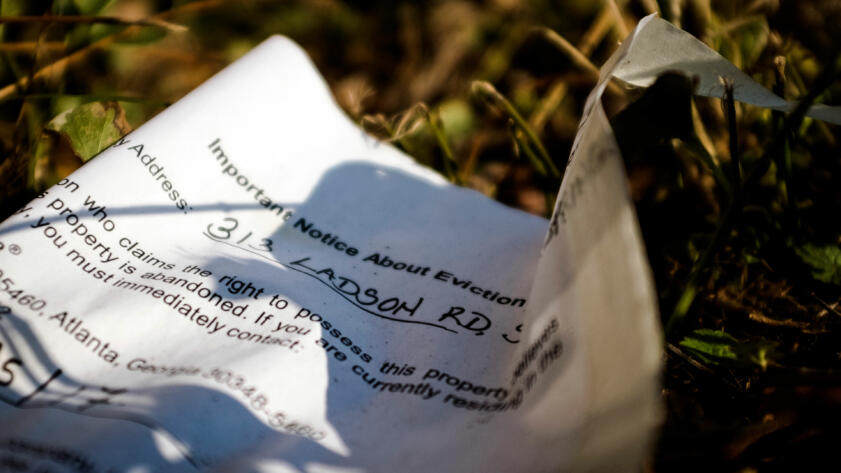At peak busy times, about 60 people facing evictions used to ask the Legal Aid Society of Milwaukee for help every week. Since the COVID-19 moratorium lifted, the group says it’s been getting that many calls to its hotline every day, some coming from more affluent parts of Milwaukee that it had never heard from before.
“We’ve almost limited our services right now to eviction crisis management, because that’s where we’re at right now,” said the group’s executive director, Colleen Foley.
She said she’s all but stopped civil rights litigation and consumer law work to dedicate staff and resources to housing defense work—plus she’s had to hire two additional full-time housing lawyers and a handful of volunteers.
Wisconsin implemented an eviction moratorium in March, but it ended in May. Job loss is so widespread, and unemployment benefits in Wisconsin are so hard to access and short-lived, that the threat of eviction looms large.
During the week of May 26, when the state’s eviction ban ended, Milwaukee County landlords filed 66 cases, Foley said. The week of June 1, they filed 204. Three weeks later, they filed 461.
20
Number of years housing cases are available online in Wisconsin.
Regardless of whether those filings end up in a payment plan or an eviction, one thing is certain: Any housing court filing, or any debt to a past landlord, will stain a renter’s record and could lock him or her out of housing options for years, if not decades. In Wisconsin, many housing court records are available online for 20 years. (State law says cases that end in agreements or in favor of the tenant are only online for two years, but still available in the courthouse for 20.)
“We’ve seen over the last few years a big uptick in landlords who will deny rental applications just because a tenant has had an eviction filed against them, regardless of what the outcome is,” said Korey Lundin, a staff attorney at another group, Legal Action of Wisconsin. “It doesn’t matter that it got dismissed by a judge, doesn’t matter that the landlord and the tenant worked it out, it doesn’t matter.”
Evictions Are Gaining Speed
The avalanche of evictions that’s been imminent during months of economic standstill is picking up speed, and it’s headed to the doorsteps of millions of Americans. Few rules govern what information can be reported by tenant screening companies or how it’s gathered, as The Markup and The New York Times recently revealed in an investigation into the industry.

Locked Out
Access Denied: Faulty Automated Background Checks Freeze Out Renters
Computer algorithms that scan everything from terror watch lists to eviction records spit out flawed tenant screening reports. And almost nobody is watching
Housing court records, which arise from disputes and debts—or mere misunderstandings—are particularly problematic because they are devoid of detail. Background screeners often scoop up only what they can scrape from free court indexes: the names of the landlord and tenant and the address of the property. They often don’t even include the resolution of the case.
“The vast majority of [eviction] cases are settled, just like any other civil case,” said Eric Dunn, director of litigation at the National Housing Law Project. “Most of the time, the landlord and the tenant will come to some kind of agreement to resolve them.”
Getting eviction records expunged by a judge is possible in some states, but advocates said it’s complicated and success is not guaranteed.
So the original record sticks around and can be scraped, bought from data brokers, and sold to future landlords, who are told in the fine print that they must check their accuracy—but landlords told us they don’t have the time.
An analysis of 3.6 million court records from 12 states by Princeton’s Eviction Lab found that 22 percent, on average, “contain ambiguous information on how the case was resolved or falsely represent a tenant’s eviction history.”
They’re not checking for accuracy; it’s just some algorithm.
Hannah Adams, Southeast Louisiana Legal Services
In New Orleans, eviction cases coming into Southeast Louisiana Legal Services are now triple what they were this time last year, said Hannah Adams, an attorney there. The state’s eviction ban expired on June 15. In many cases, Adams and her colleagues are able to get their clients on payment plans that satisfy their landlords and stop the evictions. These “consent judgments” should not show up on someone’s record as evictions, she said.
“However, we have found that consent judgments coming out of New Orleans are showing up on people’s records as evictions, through these big corporate entities that scrape eviction data,” Adams said. “These companies don’t know anything about Louisiana law, and they’re not checking for accuracy; it’s just some algorithm.”
Hit by the Virus
Charles McNeil in Mauldin, S.C., may be dealing with the effects of COVID-19 on his finances for years after his health improves.
He was hospitalized on his 74th birthday, in July, for treatment for the virus. That was after business had dried up due to the shutdown. He was supplementing his small pension and Social Security checks by working as an independent insurance salesman.
Without that extra income, he got a couple of months behind on rent, and his landlord filed an eviction case. The federal eviction ban didn’t apply to his rental, and South Carolina’s statewide eviction moratorium expired on May 15.
“I had family come in and help me, but I had to reimburse them with my next Social Security check, so it’s just like playing checkers here now, with this small amount that I have coming in,” said McNeil, who’s now back home in the apartment he shares with his son, recovering from the virus.
The eviction case was settled, but the record remains in Greenville County court records online. If McNeil decides to move, it’ll likely show up in his next tenant screening report.
McNeil’s landlord did not respond to phone calls and emails requesting comment.
Mark Fessler, who was McNeil’s pro bono attorney and heads South Carolina Legal Services’ housing unit, said in the two-month period since the state’s moratorium lifted, evictions were up 170 percent from the same time last year.
“Places that have these background check policies, especially if they’re using a third-party service to make the decision, and they’re not giving individualized attention to the circumstances, they probably won’t take into account the reason behind the negative information in the report at all,” he said. And there is no good procedure in South Carolina to seal or remove eviction cases from the public record, he said, even if they are settled with the landlord or dismissed by a judge.
Easy Access Makes It Hard
The cheap and easy availability of court records fuels the automated tenant screening industry, as we found in our prior investigation.
Background screeners are only supposed to report evictions for seven years, according to federal law. But in many counties and states, housing court records are freely available online, so anyone can type in a person’s name and quickly see if he or she was ever named in a case. Some housing-rights attorneys say this easy online access has had a drastic effect on the ability to rent a home.
It’s really changed the landscape of how we provide advice.
Alice Kwong, Legal Services of New Jersey
“It’s really changed the landscape of how we provide advice,” said Alice Kwong, co–chief counsel of housing law at Legal Services of New Jersey, who’s been practicing housing law for 18 years. For the first 10 years, she would advise people whose homes were severely neglected by their landlords to withhold rent to force an eviction hearing that would get the issue in front of a judge.
Then eviction filings began to post online, and she saw the devastating effects. Now she’s hesitant to give that advice.
“In New Jersey, a tenant does have the right to withhold rent if there’s a habitability issue,” she said. She said the result is akin to taking away someone’s right for fear that it’ll make them less desirable tenants later.
The federal eviction moratorium enacted by the CARES Act expired on July 25, and it was limited. Renters often didn’t know whether their buildings were covered by the ban. And there were no consequences for landlords who violated it.
Various bills before Congress could provide emergency assistance for renters and other relief, but their passage is uncertain.
Some states have implemented solutions, such as California, where the names of tenants are kept anonymous in housing records unless the landlord wins the case, giving many tenants the chance to resolve debts before their names get swept up by a data broker and sold to tenant background check services. But that’s uncommon. New York State; St. Paul, Minn.; and Portland, Ore., prohibit or limit landlords’ ability to reject tenants for past evictions.
"Cascade of Consequences"
In most places, however, advocates said the stain of an eviction drives people into lower-quality rentals, managed by landlords who either don’t check backgrounds or don’t care about a tenant’s past.
“You’re usually looking at severely diminished quality of housing that you can get—and you’re going to be paying more for less,” said Erin Willoughby, an Atlanta Legal Aid attorney. “If you can’t find something there, then the next step is extended-stay motels. And after that is homelessness.”
James Fishman, an attorney in New York City who represents tenants, asks landlords to file evictions in housing court against “John Doe” or “Jane Doe,” which he says is a win-win; landlords who want tenants to leave should make it easier for them, not harder.
Even if a landlord doesn’t start an eviction proceeding, he or she may hire a debt collector to collect overdue rent, which can show up on tenants’ credit reports and lower their scores. That will also make it harder for people to rent a home later on, said Ariel Nelson, staff attorney at the National Consumer Law Center.
“It’s a cascade of consequences,” she said.
Update
This story has been updated to add information about the availability of housing records in Wisconsin.





